Click here for Exit the Cuckoo's Nest's posting standards and aims.
Old Friends, Church Bells and a New Colon Mate in Cool Bengaluru
[Bengaluru, 11/28/22]
Looking for a cafe to write this, I had to walk 1.5 mile before landing in Third Wave on Cunningham Road. Spoiled by Vietnam’s proliferation of cafes, I simply expected to find at least one every two blocks here. Yesterday, I had to settle for three tiny cups of chai, bought on the street, before finding a cafe.
With its framed Arabic calligraphy over the wall clock, it was obviously an Islamic joint. About ten yards away was Salafi Masjid, with another mosque within sight, but then again, Jesus Redeems Church was also nearby. Towering over the neighborhood was Saint Mary’s Basilica, and Hindu temples dotted the landscape.
Besides these often-magnificent houses of worship, there are innumerable shrines, including those devoted to Jesus or the Virgin Mary. On his way to work, a man can just hop off his motorbike to pray, with his head bowed and hands touching the shrine.
The other day, I found three images of devotion that, placed together, certainly baffled. Crowned with fresh flowers, they showed a buxom movie star, the Virgin Mary and a shirtless man sitting by an elaborately colorful Hindu shrine. To weird me out further, Mary was superimposed onto Jesus, such that one of his eyes gave her a third one, right on the procerus. I needed a drink, man!
[Bengaluru, 12/1/22]
At the Islamic cafe, there was a stern woman in an indigo cardigan, with matching indigo and white scarf. On her head was a Puma knit cap with ochre and orange pumas. She exuded such authority, I suspected she was the cafe’s owner.
Unsmiling, she tried to figure out what I was doing there? Without waiting for this vaguely sinister Aunty-ji to pull out all my fingernails, I quickly confessed I was from Vietnam, in India for the first time and traveling alone. When she asked where my hotel was, I was shrewdly evasive.
Don’t talk to anybody, she advised, and don’t eat anything off the street. When I admitted I just had a 12-cent vegetarian samosa, she retorted, “What if you get sick?”
“I’ll go to sleep and it will go away.”
With just the vaguest hint of a smile, she pressed, “Who will help you? You are here alone.”
“I’m OK. It’s best to travel alone. When you’re with anybody else, you can never agree on anything.”
“I’m also alone.”
“You’re also traveling?”
“No, I live here, but I am alone. I lost my husband last year.”
“You’re from this neighborhood?”
“I live just down the street.”
“Uh, what do you do?”
“I take care, no, I took care of a lodge. I live in that lodge. I lost my husband, then I lost my job, because I have stomach problems.” She tapped her tummy.
To give me a local contact in case of an emergency, she gave me her phone number, but I hadn’t even bought a sim card, I told her. She even offered to show me her lodge, so I could run there after I had been swindled or mugged on the street, I suppose, or if I had eaten one too many greasy samosas, and was having intestinal issues, just like her. We could become soul, or at least colon, mates. Perhaps she wanted me to move in?
As improvisational or gullible as I was, I wiggled out of there. “OK, now I must walk down the street. Thank you for your warnings! I don’t know where I’m going. That’s what I do. Goodbye!”
I’ve just moved to another cafe. Third Wave had the worst American music, so I had to flee. American pop culture alone is reason enough for the destruction of that sexy nightmare of a nation. Americans, too, need to be saved from such spirit corroding madness. Of course, there’s also that endless war business.
Though I’ve been in India a week, I’ve only had three days to walk around. My first four nights, I stayed at a five-star hotel, courtesy of Asia Pacific Writers and Translators, who also bought my inbound ticket from Bangkok.
In Bengaluru, I was happy to see some old friends, Sally Breen, Ravi Shankar and Helder Beja, and make many new ones. There’s a circuit of globetrotting writers and intellectuals, but only if you’ve “made it,” of course.
For me, this excursion was an aberration. Rimbaud, “Once, if I remember well, my life was a feast where all hearts opened and all wines flowed.” This line is so resonant because it applies to countless situations, and to life itself. “One evening I seated Beauty on my knees. And I found her bitter. And I cursed her.”
Finding out I was invited to this festival, a noted writer sent organizer Sally Breen an angry email, but she ignored him. Privately, I heard from several academics about the West’s toxic cancel culture, which thwarts not just the exchange of ideas but creativity. Only too appropriately, it sinks into delirium and rage as it strangles itself.
Behind me, three or four women are laughing almost nonstop as they chatter, but I’m in a comfortable neighborhood in one of India’s richest cities, you say. What about all those kids slaving away in coal mines and brick kilns? Not that long ago, England also had children inside mines or chimneys, etc., and its Thames was just as repulsive as today’s Ganges. Neither case is acceptable, obviously, but India’s problems reflect the world’s.
Sipping $7 chais in Nob Hill, Park Slope or Bel Air, you’re not just benefiting from all the child and near-slave labor worldwide, but funding wars, as only Americans can, with your taxes and votes.
Victor Mallet was a keynote speaker at the festival. Indians appreciate his incisive River of Life, River of Death: The Ganges and India’s Future. How can the Ganges be worshipped by so many Indians and be simultaneously abused by the same people? Mallet asks.
As Indians kill the Ganges, this sacred river is killing Indians, but that’s the story of this entire earth. Having been civilized before much of the world, India is also showing more obvious signs of collapse than elsewhere. Should your nation survive the decades or centuries ahead, it will look just like India, but only if it is super lucky. More likely, it will resemble the worst of Philadelphia or Baltimore. Boy, do I feel blessed to be in Bengaluru and not the City of Brotherly Love, with Lawless, I kid you not, as its police commissioner.
During the 3 1/2 days of the festival, I had to flex all of my deep-fried brain cells to sound sort of smart, so was knocked out by the end. The morning I left the Renaissance Bengaluru Race Course, I was a mess. Wearing a shirt with a hole in it, I was delivered via tuk-tuk within a mile of Hotel Empire, where I’m now comfortably garrisoned.
Right near me is Cubbon Park, named after an officer of the East India Company. At an entrance is a handsome statue of Queen Victoria. A short stroll away is Koshy’s, where Nehru, Khrushchev and Queen Elizabeth II once dined. With its black and white photos, solid furniture, large mirror and ancient fans dangling from a tall ceiling, it’s certainly old school, all right. With its low light, everything and everyone was sepia tinted. Easily, I aged a century. My mediocre mutton omelet came with lousy french fries, however, and the thick sliced bread didn’t have real butter on it. Like the Ganges, perhaps Koshy’s is also dying.
Wandering around last night, I noticed a bar sign, so popped into MM, a darkened space where men drank mostly in silence. There was no music or TV, and no women. I had had the green bottled Kingfisher, not a bad ale, but here, they only had the “strong” version, which tasted too much like malt liquor.
In the dark, I observed my fellow drinkers. To my right was a man with “KURT COBAIN” on his shirt, talking to a grossly obese man in a military T-shirt. Enjoying a bottle of Red Lips port all by himself was a mustachioed fellow of about 50. Even in that gloom, I could tell his eyes were glazed. Turning to a man to my left, I chuckled, “I have never been in a bar so dark,” but he didn’t quite understand my English, so we just grinned. Settling down, I felt fine.
Not two miles away, the international writers still in Bengaluru were hanging out in Mirage, a glitzy, futuristic space where a different caste gathers.
At a poetry reading, Siddharth Dasgupta stated he found God everywhere but in temples, which I thought very funny. Though I concede God might be in some obscure, out-of-the-way temples, he, she or they are certainly everywhere, as in each human face, and perhaps that’s why we’re so terrified of looking each other in the eye, and not just figuratively. Constantly flinching, we see and hear next to nothing.
Here in India, history is a massive, bewildering accretion, and there’s “the almost-infinite permutations of human behavior on display on its streets,” to quote an Indian friend, but such density, or richness, if you will, can also aggravate.
Humans are piled on top of each other, vehicles honk, sky turns gray and rivers die, but somehow, we still manage to charm and amuse each other, and dish up loving concoctions thickened with so much culture.
By Russell Market, a young woman in sari pulls a crippled man on a wheeled board for several blocks. He is well dressed and groomed. Since they exchange not one word, it’s likely they are strangers. Haven’t you pushed a stranger’s wheelchair across the street, at least?
In smart uniforms, angelic children still prepare for the future, even as exhausted men down cheap liquor in silence, in the dark.
[Bengaluru, 12/2/22]
[Bengaluru, 12/2/22]
[Bengaluru, 11/30/22]
[Bengaluru, 11/28/22]
[Alliance University on 11/30/22]
Source: Postcards from the End

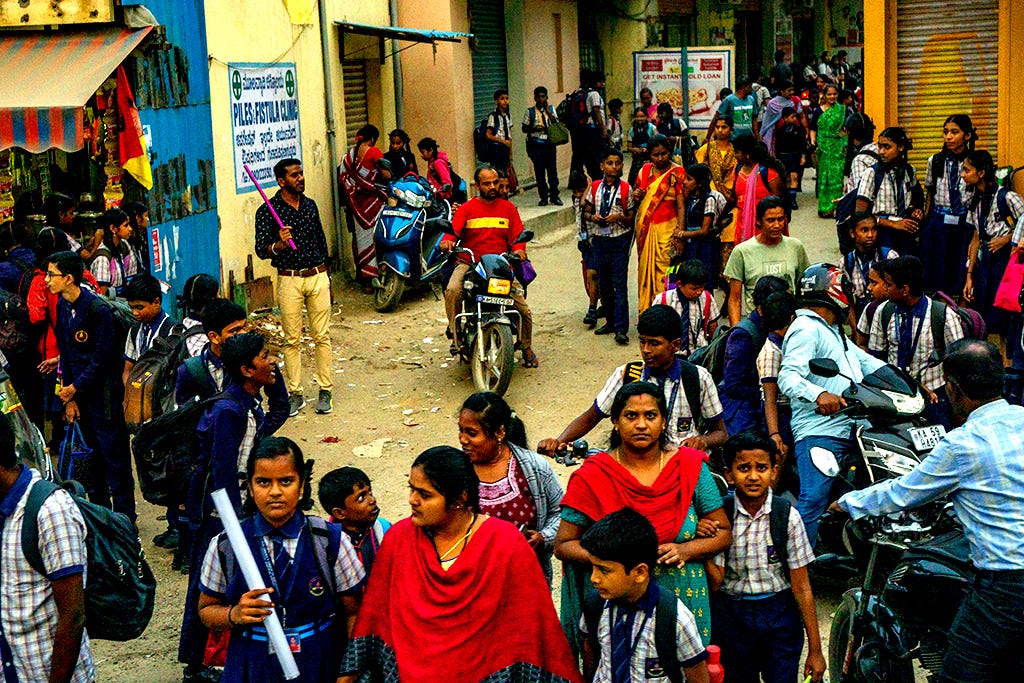
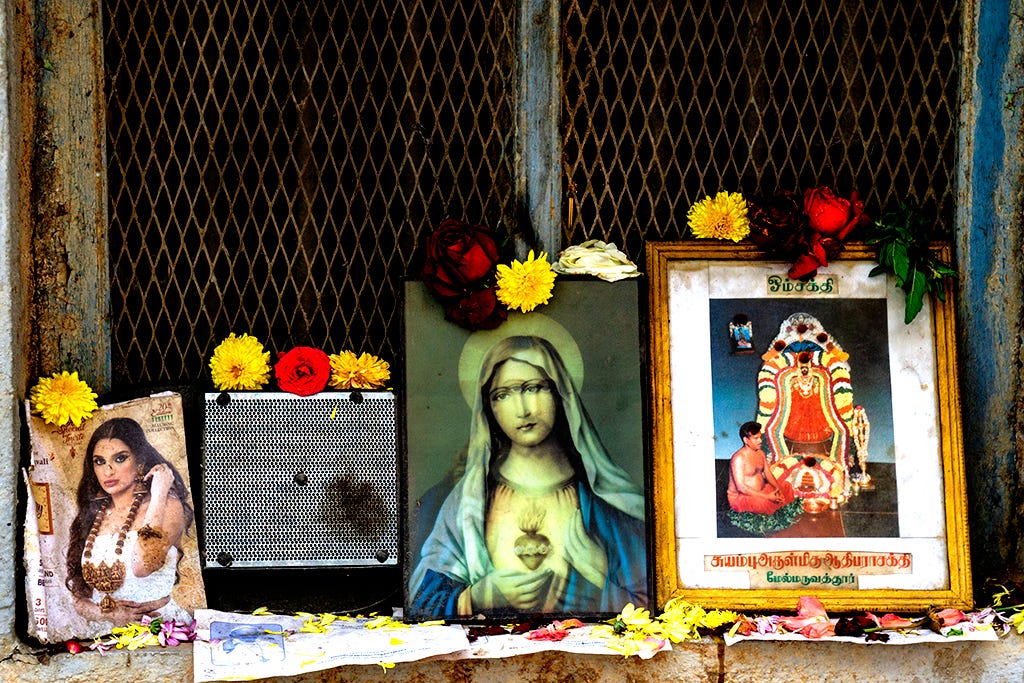
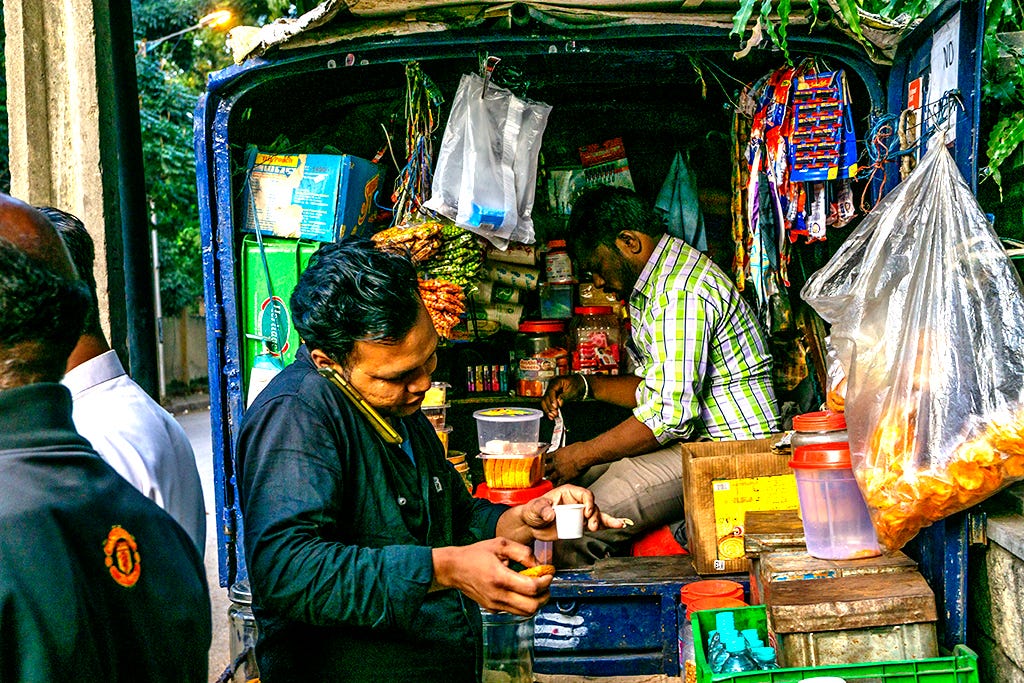
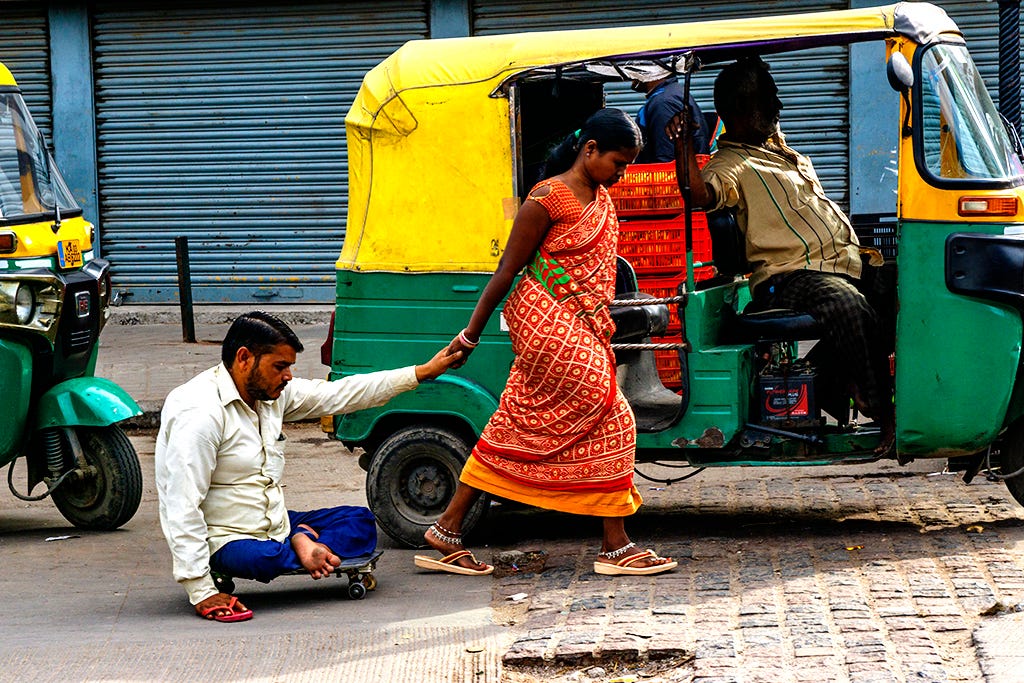
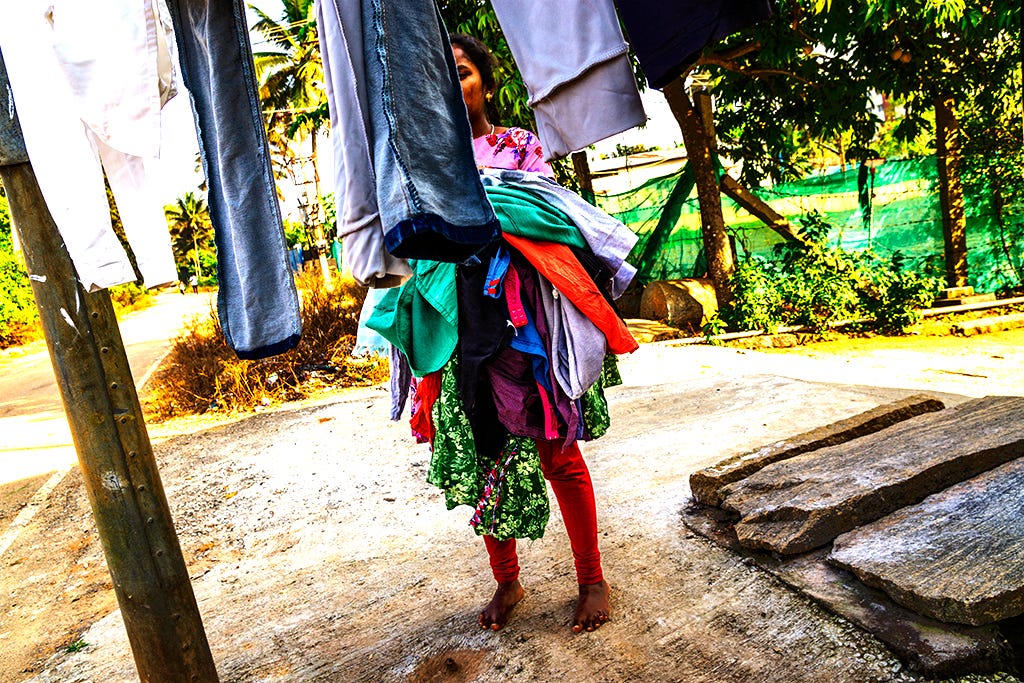
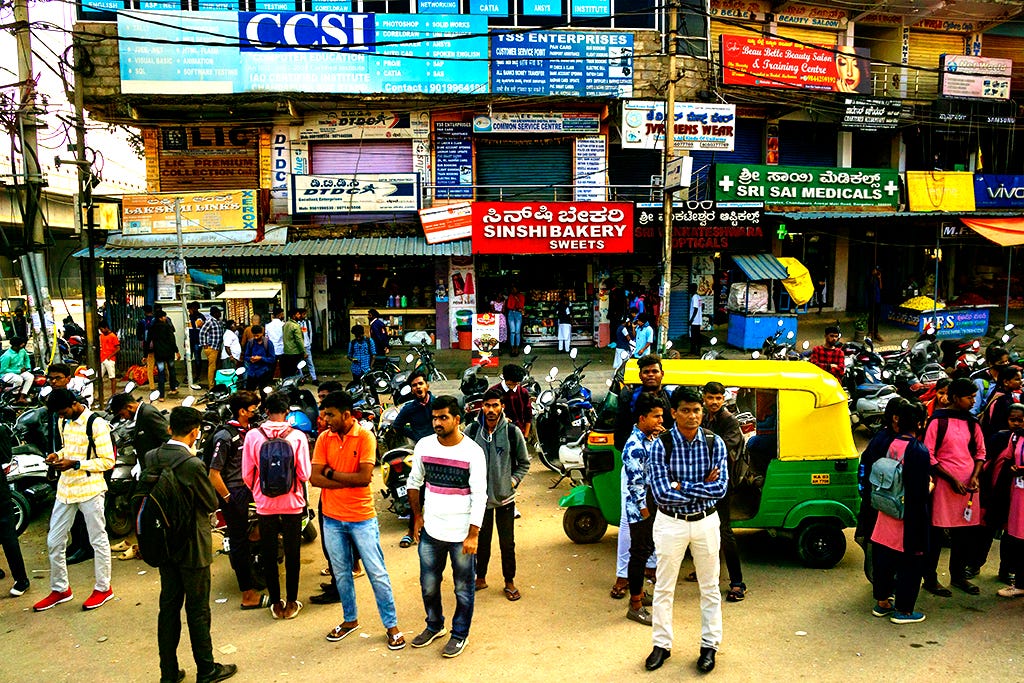
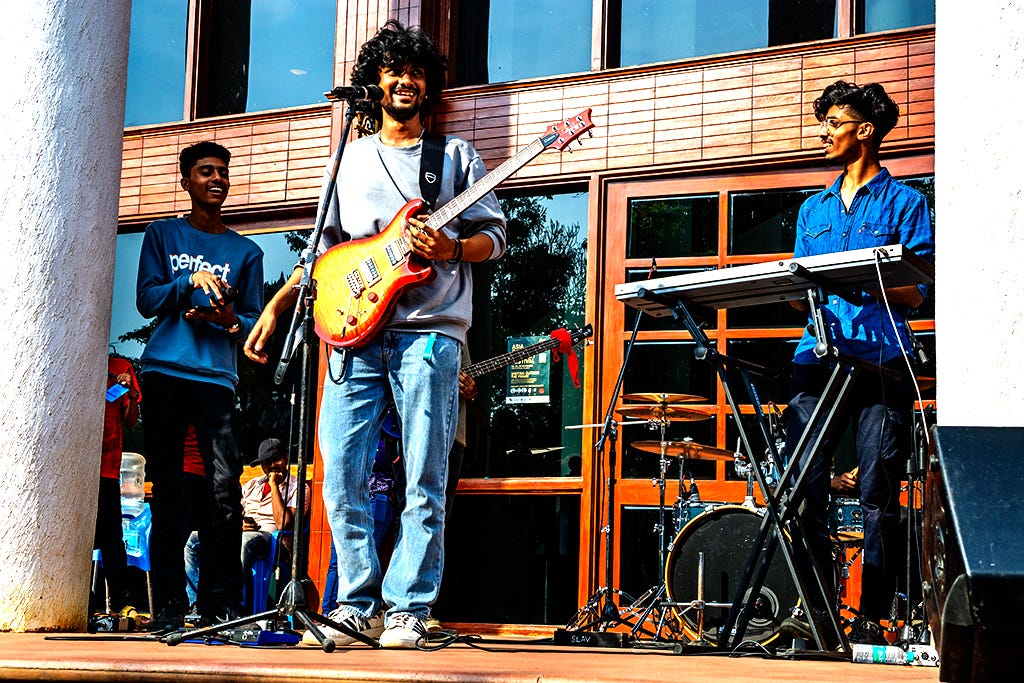
No comments:
Post a Comment